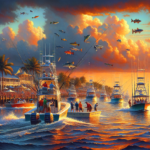Top Fishing Tournaments in Florida

Introduction
Did you know that Florida is home to some of the most prestigious fishing tournaments in the world? Whether you’re an avid angler or a casual fishing enthusiast, Florida’s diverse waters offer a plethora of opportunities to test your skills and reel in some impressive catches. This article will delve into the top fishing tournaments in Florida, covering everything from the best techniques and species to target, to the essential gear you’ll need, and tips for making the most of your fishing experience.
Fishing tournaments in Florida are not just about the thrill of the catch; they also play a significant role in promoting conservation and sustainable fishing practices. Understanding the ins and outs of these events can help you prepare better, whether you’re aiming to participate or simply want to enjoy the spectacle. So, let’s dive in and explore what makes Florida a premier destination for fishing tournaments.
Background/Context
Historical or Cultural Significance
Florida’s fishing culture dates back centuries, with indigenous tribes relying on the state’s abundant waters for sustenance. Over time, fishing evolved from a means of survival to a popular recreational activity. Today, Florida is renowned for its fishing tournaments, which attract participants from around the globe. These events not only celebrate the sport but also contribute to local economies and promote environmental stewardship.
Geographical Overview
Florida’s unique geography, with its extensive coastline, numerous lakes, and intricate river systems, provides an ideal setting for diverse fishing experiences. The state’s subtropical climate ensures year-round fishing opportunities, while its varied ecosystems support a wide range of fish species. From the Atlantic Ocean and the Gulf of Mexico to the freshwater lakes and rivers, Florida offers a fishing paradise for anglers of all skill levels.
Key Points/Details
Fishing Techniques
Technique Overview
Florida’s fishing tournaments often feature a variety of techniques, including fly fishing, trolling, bottom fishing, and casting. Each technique requires specific skills and equipment, making it essential to understand the nuances of each method.
When and Where to Use
Different techniques are suited to different environments and target species. For example, fly fishing is popular in freshwater lakes and rivers, while trolling is commonly used in deep-sea fishing. Understanding the best times and locations to employ these techniques can significantly enhance your chances of success.
Recommended Gear
- Fly Fishing: Lightweight rods, floating lines, and artificial flies.
- Trolling: Heavy-duty rods, trolling reels, and lures or live bait.
- Bottom Fishing: Medium to heavy rods, bottom rigs, and natural bait.
- Casting: Spinning rods, casting reels, and a variety of lures.
Species Information
Species Overview
Florida’s waters are teeming with a diverse array of fish species, each with its own unique habits and habitats. Some of the most sought-after species in fishing tournaments include tarpon, snook, redfish, sailfish, and largemouth bass.
Best Practices
To successfully catch these species, it’s crucial to understand their behavior and preferred environments. For instance, tarpon are known for their acrobatic leaps and are often found in coastal waters, while largemouth bass prefer freshwater lakes and rivers. Using the right techniques and gear tailored to each species can make all the difference.
Location Information
Top Fishing Spots
- Florida Keys: Known for its clear waters and abundant marine life, the Keys are a hotspot for tarpon, bonefish, and permit.
- Lake Okeechobee: One of the largest freshwater lakes in the U.S., it’s famous for its largemouth bass fishing.
- St. Johns River: A prime location for freshwater species like bass and crappie.
- Gulf of Mexico: Offers excellent opportunities for deep-sea fishing, targeting species like grouper and snapper.
Regulations and Licenses
Florida has specific fishing regulations to ensure sustainable practices. Anglers must obtain the appropriate licenses, which vary depending on whether you’re fishing in freshwater or saltwater. Additionally, there are catch limits and seasonal restrictions for certain species. It’s essential to familiarize yourself with these regulations to avoid penalties and contribute to conservation efforts.
Seasonal Considerations
Seasonal Variations
Fishing conditions in Florida can vary significantly throughout the year. For example, tarpon season peaks in the spring and early summer, while largemouth bass are more active during the cooler months. Understanding these seasonal variations can help you plan your fishing trips more effectively.
Best Times to Fish
The optimal times for fishing often depend on the species you’re targeting. Early morning and late afternoon are generally the best times for most species, as fish are more active during these cooler periods. Additionally, tidal movements can influence fish behavior, making it essential to consider tide charts when planning your fishing trips.
Events and Tournaments
Event Overview
Florida hosts numerous fishing tournaments throughout the year, catering to various skill levels and target species. Some of the most notable events include:
- Florida Keys Tarpon Tournament: Held annually in May, this event attracts anglers from around the world to compete for the largest tarpon.
- Big Rock Blue Marlin Tournament: One of the oldest and most prestigious marlin tournaments, held in June off the coast of North Carolina but attracting many Florida anglers.
- Lake Okeechobee Bass Tournament: A popular event for bass fishing enthusiasts, held multiple times throughout the year.
- Destin Fishing Rodeo: A month-long event in October, featuring various categories and prizes for different species.
Preparation Tips
Preparing for a fishing tournament requires careful planning and practice. Here are some tips to help you get ready:
- Research: Study the tournament rules, target species, and fishing techniques.
- Practice: Spend time honing your skills and familiarizing yourself with the fishing area.
- Gear: Ensure you have the right equipment and backup gear in case of emergencies.
- Health: Stay hydrated, wear sunscreen, and bring snacks to keep your energy levels up.
Tips and Best Practices
General Tips
- Stay Informed: Keep up-to-date with local fishing reports and weather conditions.
- Be Patient: Fishing requires patience and persistence. Don’t get discouraged if you don’t catch anything right away.
- Respect Nature: Follow catch-and-release practices and respect local wildlife.
Avoid Common Mistakes
- Overloading Gear: Avoid bringing too much gear, which can be cumbersome and unnecessary.
- Ignoring Regulations: Always adhere to local fishing regulations to avoid fines and contribute to conservation efforts.
- Neglecting Safety: Prioritize safety by wearing life jackets and being aware of your surroundings.
Advanced Techniques
- Using Electronics: Utilize fish finders and GPS devices to locate fish and navigate waters more effectively.
- Mastering Knots: Learn advanced fishing knots to ensure your lines are secure and can handle larger catches.
- Adapting to Conditions: Be flexible and adjust your techniques based on changing weather and water conditions.
Gear and Equipment Recommendations
Essential Gear
- Rods and Reels: Choose rods and reels suited to your target species and fishing technique.
- Lines and Leaders: Use appropriate lines and leaders for the type of fishing you’re doing.
- Bait and Lures: Stock up on a variety of bait and lures to attract different species.
- Safety Gear: Include life jackets, first aid kits, and emergency signaling devices.
Optional Gear/Upgrades
- Fish Finders: Advanced electronics to help locate fish more efficiently.
- Coolers: High-quality coolers to keep your catch fresh.
- Fishing Apparel: Specialized clothing to protect against the sun and improve comfort.
Where to Buy or Rent
You can purchase or rent fishing gear from local shops or online retailers. Some popular options include Bass Pro Shops, Cabela’s, and local bait and tackle stores. Renting gear can be a cost-effective option if you’re participating in a one-time event or trying out new equipment.
Safety and Conservation
Safety Tips
- Weather Awareness: Always check the weather forecast before heading out and be prepared for sudden changes.
- Wildlife Hazards: Be aware of local wildlife, such as alligators and jellyfish, and know how to avoid them.
- Boating Safety: Follow boating safety guidelines, including wearing life jackets and knowing how to operate your vessel.
Conservation Practices
- Catch and Release: Practice catch-and-release to help maintain fish populations.
- Respect Regulations: Adhere to local fishing regulations, including size and bag limits.
- Minimize Impact: Avoid damaging habitats and dispose of trash properly.
Planning Your Trip
Accommodations
Florida offers a wide range of accommodations near popular fishing spots, from luxury resorts to budget-friendly motels. Some recommended options include:
- Florida Keys: Cheeca Lodge & Spa, Hawks Cay Resort.
- Lake Okeechobee: Roland Martin Marina & Resort, Lake Okeechobee KOA.
- Destin: Henderson Beach Resort, Sandestin Golf and Beach Resort.
Travel Tips
- Routes: Plan your route in advance and consider traffic conditions, especially during peak tourist seasons.
- Transportation: Renting a car can provide flexibility, especially if you’re traveling with fishing gear.
- Local Knowledge: Consult local guides or fishing charters for insider tips and the best fishing spots.
Additional Activities
If you’re traveling with family or friends who aren’t as passionate about fishing, Florida offers plenty of other activities to enjoy, such as:
- Beaches: Relax on some of the world’s most beautiful beaches.
- Water Sports: Try kayaking, paddleboarding, or snorkeling.
- Wildlife Tours: Explore Florida’s unique wildlife through guided tours and nature walks.
Frequently Asked Questions (FAQs)
What are the best months for fishing in Florida?
The best months for fishing in Florida vary depending on the species. Generally, spring and fall offer excellent conditions for most species, while summer is ideal for tarpon and winter for largemouth bass.
Do I need a fishing license in Florida?
Yes, a fishing license is required for both residents and non-residents. Licenses can be purchased online or at local retailers. Specific licenses are needed for freshwater and saltwater fishing.
What is the most popular fishing tournament in Florida?
The Florida Keys Tarpon Tournament is one of the most popular and prestigious fishing tournaments in the state, attracting anglers from around the world.
Can I rent fishing gear in Florida?
Yes, many local bait and tackle shops, as well as fishing charters, offer gear rental services. This can be a convenient option if you’re traveling or trying out new equipment.
Conclusion
Florida’s fishing tournaments offer a unique blend of excitement, competition, and conservation. Whether you’re a seasoned angler or a beginner, understanding the techniques, species, and locations can enhance your fishing experience. By following the tips and best practices outlined in this article, you’ll be well-prepared to participate in or enjoy these events. So grab your gear, head to Florida, and experience some of the best fishing tournaments the world has to offer!
Remember, fishing is not just about the catch; it’s about the journey, the camaraderie, and the connection with nature. Happy fishing!

